|
Books Should Be Free Loyal Books Free Public Domain Audiobooks & eBook Downloads |
|
|
Books Should Be Free Loyal Books Free Public Domain Audiobooks & eBook Downloads |
|
Non-fiction |
|---|
|
Book type:
Sort by:
View by:
|
By: Charles Lathrop Pack (1857-1937) | |
|---|---|
 School Book of Forestry
School Book of Forestry
Written by a third-generation timberman, this book discusses what forests are, their primary enemies, and their benefits to others. Additionally, mention is made of the U.S. National Forest system. | |
By: Charles Mackay (1814-1889) | |
|---|---|
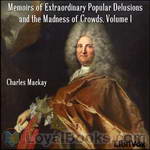 Memoirs of Extraordinary Popular Delusions and the Madness of Crowds
Memoirs of Extraordinary Popular Delusions and the Madness of Crowds
The book chronicles and vilifies its targets in three parts: “National Delusions”, “Peculiar Follies”, and “Philosophical Delusions”.The subjects of Mackay’s debunking include alchemy, beards (influence of politics and religion on), witch-hunts, crusades and duels. Present day writers on economics, such as Andrew Tobias, laud the three chapters on economic bubbles. | |
By: Charles MacLaurin (1872-1925) | |
|---|---|
 Post Mortem: Essays, Historical And Medical
Post Mortem: Essays, Historical And Medical
This 1922 collection of extensive essays comprises well written biographies of a few famous folk. The life narratives include analyses of medical and/or psychological elements in each person’s life. Biographies include Anne Boleyn, Jeanne D’Arc, The Empress Theodora, The Emperor Charles V, Don John Of Austria, Cervantes, Don Quixote , Philip II, Mr. and Mrs. Pepys, Edward Gibbon, Jean Paul Marat, Napoleon I, and Benvenuto Cellini. It concludes with an extended meditation on death. “But there... | |
By: Charles McRae | |
|---|---|
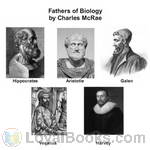 Fathers of Biology
Fathers of Biology
An account given of the lives of five great naturalists (Hippocrates, Aristotle, Galen, Vesalius and Harvey) will not be found devoid of interest. The work of each one of them marked a definite advance in the science of Biology. There is often among students of anatomy and physiology a tendency to imagine that the facts with which they are now being made familiar have all been established by recent observation and experiment. But even the slight knowledge of the history of Biology, which may be obtained from a perusal of this little book, will show that, so far from such being the case, this branch of science is of venerable antiquity... | |
By: Charles Morris (1833-1922) | |
|---|---|
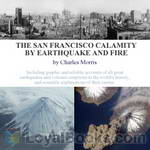 The San Francisco Calamity by Earthquake and Fire
The San Francisco Calamity by Earthquake and Fire
The first half of this book describes the devastating earthquake that hit San Francisco in 1906, and the subsequent destruction caused by fire. Various eyewitnesses and victims give their account on the tragedy. In the second half, a number of different other earthquakes and volcanic eruptions are retold, like the eruption of the Vesuvius that destroyed Pompeij or the explosion of the Krakatoa, together with scientific explanations for the causes of earthquakes and the eruption of volcanos. | |
 Chronicles of America Volume 09 - Colonial Folkways
Chronicles of America Volume 09 - Colonial Folkways
This work according to the subtitle is "a chronicle of American life in the reign of the Georges." It describes land, locales, houses, habits, diversions, learning, religion, labor, and travel. | |
By: Charles R. Gibson (1870-1931) | |
|---|---|
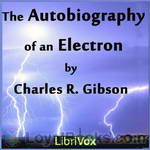 The Autobiography of an Electron
The Autobiography of an Electron
"While many scientific men now understand our place in the universe, we electrons are anxious that every person should know the very important part which we play in the workaday world. It was for this reason that my fellow-electrons urged me to write my own biography. I am pleased to say that my relationship with the scribe who has put down my story in the following pages has been of the most friendly description. I have allowed him to place what he calls "The Scribe's Note" at the beginning of each chapter, but it will be understood clearly that these are merely convenient embellishments, and that I am responsible for the story of my own experiences." (Introduction adapted from the text) | |
By: Charles Spurgeon (1834-1892) | |
|---|---|
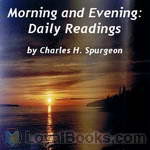 Morning and Evening: Daily Readings
Morning and Evening: Daily Readings
Organized by week, this devotional has a morning and evening meditation for every day of the year. Although these devotions are short in length, they are filled with spiritual goodness. In just a few sentences, Spurgeon is able to convey the wisdom of Scripture with eloquence and purpose. These daily messages provide Christians with the spiritual energy they need to begin and end each day. Spurgeon weaves a verse of Scripture into each devotion, helping readers draw deeper meaning out of the selected passages... | |
By: Charles Warren Stoddard (1843-1909) | |
|---|---|
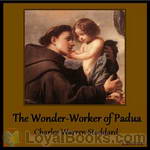 The Wonder-Worker of Padua
The Wonder-Worker of Padua
This is the inspiring story of Saint Anthony of Padua (1195-1231). The son of a wealthy Portuguese family, he was initially ordained a priest of the Canons Regular of Saint Augustine. In 1221, he took up the habit of a poor Franciscan friar and devoted his life to fervently preaching the Word of God. His extensive knowledge of Sacred Scripture and keen insights into its profound spiritual meaning astonished his hearers. To confirm the efficacy of his words, God gave him the gifts of prophecy and of performing miracles, the most memorable of which he worked in Padua in northern Italy, where he resided for many years... | |
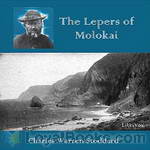 The Lepers of Molokai
The Lepers of Molokai
This is the story of the lepers of Molokai and of the Roman Catholic missionary, Father Damien, who ministered to those who languished in that desolate place, waiting for death to release them from a most intense form of physical and mental suffering. Fr. Damien, born Jozef De Veuster, was a Roman Catholic priest from Belgium and member of the Congregation of the Sacred Hearts of Jesus and Mary, a missionary religious order. He won recognition for his ministry to people with leprosy (Hansen's disease), who had been placed under a government-sanctioned medical quarantine on the remote island of Molokai in the Kingdom of Hawaii... | |
By: Charlotte Maria Tucker (A. L. O. E.) (1821-1893) | |
|---|---|
 Story Of A Needle
Story Of A Needle
A story told, through the viewpoint of a sewing needle, about family life and siblings. The narration from the needle tells how he was made and witnesses the relationships within the family. The needle also makes friends with a thimble and some scissors. - Summary by Susan Russell | |
By: Charlotte Turner Smith (1749-1806) | |
|---|---|
 Emmeline, the Orphan of the Castle
Emmeline, the Orphan of the Castle
This book was written about 150 years ahead of its time. It tells the story of Emmeline Mobwray who grows up in a dysfunctional family and has to find herself against all odds. Orphaned at a young age, she has to stay alone in a remote castle under the care of a kind housekeeper. But when the kind housekeeper dies, the family starts to take interest in her- to mixed results. Her cousin becomes obsessed with her, much to the displeasure of his wealthy and arrogant parents. Thus, Emmeline is forced to run away from the only home she knew in order to escape his attentions... | |
By: Chesterton, G. K. | |
|---|---|
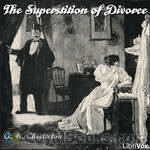 The Superstition of Divorce
The Superstition of Divorce
This short book was written in 1920, and in it Chesterton, with his usual wit and incisive logic, presents a series of articles defending marriage and indicating the weaknesses in divorce. He did this 16 year before the first Christian denomination in the world allowed it’s members to divorce. Till then Christendom was unanimous in standing against it. Chesterton saw clearly the trends of this time, and delivered this defense. | |
By: Christopher Morley (1890-1957) | |
|---|---|
 Mince Pie
Mince Pie
Mince Pie is a compilation of humorous sketches, poetry, and essays written by Christopher Morley. Morley sets the tone in the preface: "If one asks what excuse there can be for prolonging the existence of these trifles, my answer is that there is no excuse. But a copy on the bedside shelf may possibly pave the way to easy slumber. Only a mind "debauched by learning" (in Doctor Johnson's phrase) will scrutinize them too anxiously." | |
 Shandygaff
Shandygaff
A number of most agreeable Inquirendoes upon Life & Letters, interspersed with Short Stories & Skits, the whole most Diverting to the Reader. SHANDYGAFF: a very refreshing drink, being a mixture of bitter ale or beer and ginger-beer, commonly drunk by the lower classes in England, and by strolling tinkers, low church parsons, newspaper men, journalists, and prizefighters. Said to have been invented by Henry VIII as a solace for his matrimonial difficulties. It is believed that a continual bibbing of shandygaff saps the will, the nerves, the resolution, and the finer faculties, but there are those who will abide no other tipple... | |
By: Christopher Wilson (1874-1919) | |
|---|---|
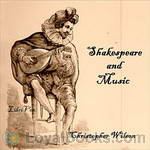 Shakespeare and Music
Shakespeare and Music
Shakespeare's plays are full of music: love songs, comic ditties, serious ballads, and songs for witches and spirits. Over the centuries musicians and composers have also created musical adaptations based on Shakespeare's plays. Composer Christopher Wilson's Shakespeare and Music (1922) documents the musical history of each play across various genres, including opera and incidental music. | |
By: Christy Mathewson (1880-1925) | |
|---|---|
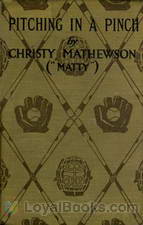 Pitching in a Pinch
Pitching in a Pinch
In this book Mathewson is telling the reader of the game as it is played in the Big Leagues.... It’s as good as his pitching and some exciting things have happened in the Big Leagues, stories that never found their way into the newspapers. Matty has told them. This is a true tale of Big Leaguers, their habits and their methods of playing the game, written by one of them. | |
By: Clara Barton (1821-1912) | |
|---|---|
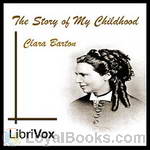 The Story of My Childhood
The Story of My Childhood
Clara Barton, founder of the American Red Cross, recalls growing up in early 19th Century Massachusetts. (Introduction by Veronica Jenkins) | |
By: Clara Dillingham Pierson (1868-1952) | |
|---|---|
 Living With Our Children: A Book of Little Essays for Mothers
Living With Our Children: A Book of Little Essays for Mothers
This book is a collection of small essays to help parents better understand their children and offer help to parents in the task of raising them. To quote from the preface, “It is hoped that the very simplicity and homeliness of method of this book may help eager, devoted, perplexed parents to realize that similarity in apparent diversity which underlies the experiences of different people, to perceive more clearly that the small affairs of childhood are really very large in their significance and that our way of dealing with them concerns far more than the present moment.” Summary by SweetHome. | |
By: Clarence Darrow (1857-1938) | |
|---|---|
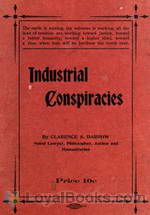 Industrial Conspiracies
Industrial Conspiracies
| |
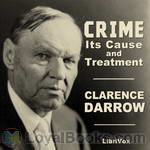 Crime: Its Cause and Treatment
Crime: Its Cause and Treatment
Clarence Darrow was an American lawyer. He remains notable for his wit and agnosticism, which marked him as one of the most famous American lawyers and civil libertarians.In this book, Darrow expands on his lifelong contention that psychological, physical, and environmental influences—not a conscious choice between right and wrong—control human behavior. To my ears (the reader's), the author has a rather simplistic behaviourist view of human behaviour, but he argues his position with wonderful clarity... | |
 Clarence Darrow, Selected Works: 1893-1917
Clarence Darrow, Selected Works: 1893-1917
This is a collection of 8 works by Clarence Darrow written between 1893 and 1917. Clarence Darrow was most noted in his time as an enormously successful defense attorney. Consider that he was the defense attorney at the Scopes Monkey Trial and at the "trial of the century", the Bobby Franks murder trial. He, like Robert G. Ingersoll, William Cowper Brann , William Jennings Bryan , Daniel Webster, etc. was also known as a world-class orator. These collected 8 works include speeches, essays, and public debates. The man had a silver tongue... sharpened to a rapier's edge! | |
By: Clarence Edwords (b. 1856) | |
|---|---|
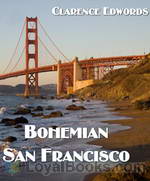 Bohemian San Francisco
Bohemian San Francisco
While describing his dining experiences throughout “Bohemian San Francisco,” Clarence Edwords paints an historic panorama of California cuisine with all its cosmopolitan influences. Best of all, he offers tantalizing recipes culled from conversations with the master chefs of 1914 in “The City by the Bay.” | |
By: Claude Grahame-White (1879-1959) | |
|---|---|
 Aeroplane in War
Aeroplane in War
"Although it is still a crude machine—in view of the perfected apparatus which is the aim of thoughtful designers—the aeroplane has demonstrated, in a conclusive way, its value as an instrument of war." - Summary by Authors | |
By: Claude H. Miller | |
|---|---|
 Outdoor Sports and Games
Outdoor Sports and Games
The Library of Work and Play, OUTDOOR SPORTS AND GAMESBy CLAUDE H. MILLER, PH.B.INTRODUCTORY The human body a perfect machine--How to keep well--Outdoor sleeping--Exercise and play--Smoking--Walking Suppose you should wake up Christmas morning and find yourself to be the owner of a bicycle. It is a brand-new wheel and everything is in perfect working order. The bearings are well oiled, the nickel is bright and shiny and it is all tuned up and ready for use. If you are a careful, sensible boy you can have fun with it for a long time until finally, like the One Hoss Shay in the poem, it wears out and goes to pieces all at once... | |
By: Clayton Edwards | |
|---|---|
 Treasury of Heroes and Heroines
Treasury of Heroes and Heroines
It would be pleasant indeed to gather the characters of this book together and listen to the conversation of wholly different but interested couples—for this is a book of contrasts and has been written as such. Lives of the most dramatic and adventurous quality have been gathered from all corners of the earth, and from every age in history, in such a way that they may cover the widest possible variety of human experience. The publishers believe that such a book would not be complete without some characters that are no less real because they have lived only in the minds of men... | |
By: Cleveland Moffett (1863-1926) | |
|---|---|
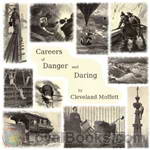 Careers of Danger and Daring
Careers of Danger and Daring
In this volume of adventure the author depicts the lives of certain humble modern heroes whose unconscious courage ordinarily goes unnoticed. Mr. Moffett has chosen unusual and picturesque careers, and has offered dramatic scenes from the lives of the steeple climber, the diver, the balloonist,the pilot, the bridge builder, the fireman, the aerial acrobat, the wild animal trainer, the dynamite worker and lastly the locomotive driver. | |
By: Columbia Accident Investigation Board | |
|---|---|
 Columbia Accident Investigation Board Final Report, Volume 1
Columbia Accident Investigation Board Final Report, Volume 1
In 1981, Columbia became the first spacecraft of its type to fly in Earth orbit and successfully completed 27 missions over more than two decades. During the STS-107 mission, Columbia and its crew traveled more than six million miles in 16 days. The Orbiterʼs destruction, just 16 minutes before scheduled touchdown, shows that space flight is still far from routine. It involves a substantial element of risk, which must be recognized, but never accepted with resignation. The seven Columbia astronauts believed that the risk was worth the reward... | |
By: Constance Johnson | |
|---|---|
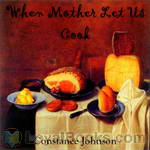 When Mother Lets Us Cook
When Mother Lets Us Cook
A book of simple receipts for little folk with important cooking rules in rhyme together with handy lists of the materials and utensils needed for the preparation of each dish. | |
By: Cornelia Mee | |
|---|---|
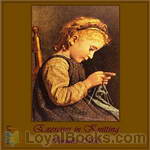 Exercises in Knitting
Exercises in Knitting
Mrs. Mee, her husband, and her sister ran a yarn and needlework import/warehouse business in Bath, England. Her books primarily contain practical everyday items that knit up quickly with the busy homemaker in mind. At this time, published knitting “receipts” did not contain abbreviations and were laborious to use. They were, however, rich in error! Later in her career, due to circumstances of war and the resulting social stress and poverty, many of her knitting books were printed for ladies’ charitable societies, which used her knitting “receipts” to clothe the poor mill workers who were out of work due to the American Civil War and the embargo of cotton. | |
By: Cyril of Alexandria (376-444) | |
|---|---|
 That Christ Is One
That Christ Is One
Cyril of Alexandria was the leading voice of Nicene orthodoxy in the Christological controversies between Constantinople (381) and Chalcedon (451). Assuming the mantle of the Cappadotian fathers, he answered the auguments of Nestorius who had changed the liturgy of Constantinople by altering the prayer which referred to Mary as the Mother of God. Although he died seven years before the Council of Chalcedon, his writings and formulations heavily influenced not only Chalcedon, but the entire trajectory of orthodox christological thought. | |
By: D. B. Casteel (1877-1958) | |
|---|---|
 Behavior of the Honey Bee in Pollen Collecting
Behavior of the Honey Bee in Pollen Collecting
The value of the honey bee in cross pollinating the flowers of fruit trees makes it desirable that exact information be available concerning the actions of the bee when gathering and manipulating the pollen. The results recorded in this manuscript are also of value as studies in the behavior of the bee and will prove interesting and valuable to the bee keeper. The work here recorded was done by Dr. Casteel during the summers of 1911 and 1912. | |